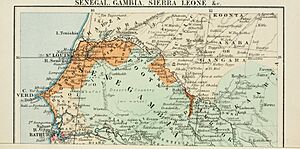Senegambia facts for kids

Senegambia is a special region in West Africa. It covers the land where the countries of Senegal and Gambia are today.
Sometimes, the name Senegambia also refers to the Senegambia Confederation. This was a loose agreement between Senegal and Gambia in the 20th century. The British first used the term "Senegambia" way back in 1765. They used it for their settlements on islands near what is now Senegal. Today, when people say Senegambia, they usually mean the whole area that includes both Senegal and Gambia.
Senegambian History
We don't know much about the very early history of this area. But by about 1000 AD, different groups of people had started to form villages. These included the Soninke, Mandinka, and Fula peoples. They settled along the Gambia River. The Toucouleur people lived in eastern and central Senegal. Other kingdoms, like Jolof and the Sere, settled north of the Gambia River.
The first Europeans to arrive were Portuguese sailors around 1455. Portugal controlled the area between the Sénégal and Gambia Rivers for a while. Later, the British, Dutch, and French also moved into the region. They traded things like salt, iron, guns, and gunpowder. In return, they received gold, ivory, ebony, and enslaved people.
Senegambia and the Middle Passage
About 24% of all the African people brought to America as slaves came from Senegambia. These enslaved Africans from Senegambia were found almost everywhere in the United States before the American Civil War. This included both the northern and southern parts of the country.
Many people in Senegambia were Muslim. This meant that many enslaved Africans in the US had learned about Islam. They knew more about it than enslaved people in other parts of the Americas.
Slave traders needed many people to work on farms. Because of this, up to two-thirds of the Africans taken captive were men. In the Senegambia region, men and boys were taken from all over the area. This was because buyers wanted them so much. However, women were less in demand. So, they were mostly taken from the easily reached coastal areas. Most of these women were from the Jolof people. Unlike the men, they often shared a common language.
Slave owners feared that enslaved people would revolt. Because of this, men were kept below decks on ships and in chains. Women were usually kept on deck and sometimes allowed to move around. Some historians believe that it was the women who organized many of the slave uprisings at sea.
Images for kids
-
Youssou N'Dour at the 2008 Toronto International Film Festival.
 | Lonnie Johnson |
 | Granville Woods |
 | Lewis Howard Latimer |
 | James West |




